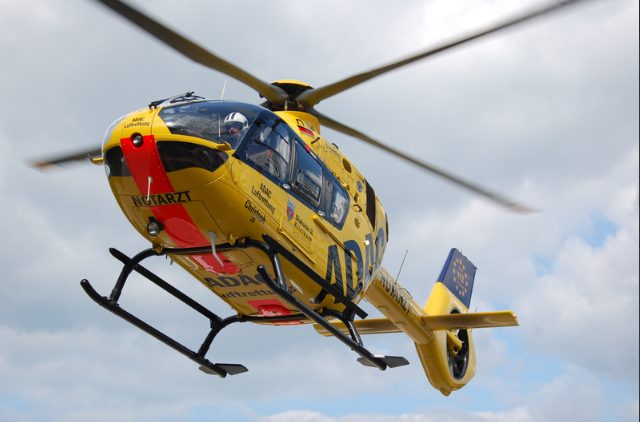Helicopters help fight corona – exchange of experience on a
global level as part of the new EUROPEAN ROTORS trade fair
Helicopters help to cope with the corona crisis
Friedrichshafen – Helicopters play an
outstanding role in the current health crisis due to their special flight
characteristics. They are not only important for the transfer of infectious and
ventilated patients from hospital to hospital, but they also secure relevant infrastructure
through monitoring flights.
The outbreak of the coronavirus has triggered a global crisis that has brought normal life to a standstill and pushed the capacity of health care systems worldwide to their limits. Hospitals in particularly affected regions, such as Lombardy in Italy, or Paris and the Alsace in France, are being overrun by a “tsunami of patients” and are unable to provide adequate care to all patients.In order to manage care effectively, patients are evacuated to hospitals elsewhere in the country and abroad, which still have sufficient capacity of intensive care beds and ventilators.
In addition to the specially equipped Medevac aircraft of the various armed forces, converted TGV high-speed trains and a large number of civil helicopters are also used.The special characteristics of the rotary wing aircraft allow a gentle and fast transport of Covid-19 patients from one hospital directly to another. Since the end of March, Helicopter Emergency Medical Service (HEMS) operators such as ADAC Luftrettung, DRF, Luxembourg Air Rescue and Sécurité Civile, alongside other EMS operators, have flown many patients suffering from Covid-19 from France to other hospitals in the country and abroad for intensive care treatment.
Since April 7, the first Airbus H145 rescue helicopter specially equipped for the transport of Covid-19 patients has been made available for nationwide transport by the ADAC Luftrettung in Ludwigshafen/Germany. “Christoph 112” is specially equipped for the transfer of ventilated and intensive care patients and is available 24/7. After transporting an infectious patient, a helicopter has to be disinfected, which takes about two hours.
During this time, it is not available for normal rescue operations, which are still necessary during the current crisis. In the UK the British Helicopter Association has organised numerous helicopters amongst its member operators to support the UK Government’s crisis response activity.Dr. Frank Liemandt, Show Director of the helicopter trade fair EUROPEAN ROTORS, which takes place in Cologne from 10-12 November, says: “Helicopters are systemically relevant in providing indispensable services to society.
As another example, unfortunately, in the near future the fire season will start again in Europe. Forest fires do not stop because of the corona crisis.
That is why it is very important to keep commercial operators running who can provide appropriate capacities.” At EUROPEAN ROTORS the experience of helicopter operators in dealing with the corona pandemic and other cross-border catastrophic scenarios will be exchanged. How can we achieve better European cooperation? and what can we do better? are two points that will certainly be discussed at the EUROPEAN ROTORS show.Very early in the crisis, the European Aviation Safety Agency (EASA) published guidelines for the national aviation authorities taking the effects of the crisis into account when renewing pilot and mechanic licenses. Since many pilots are currently unable to fly or to take a required training or check flights, they now have four months longer to provide the necessary evidence for the renewal of their licenses and medicals.
This eases the pressure considerably on pilots and operators alike. In addition, EASA also issued guidelines for COVID-19 medical installations for national aviation authorities to approve exemptions or for Design Organisation Approval holders to certify such installations when possible. EASA is processing the certification of these installations with the highest priority and free of charge. This crisis is also an opportunity to identify how to improve the European Aviation framework and EUROPEAN ROTORS will be a unique opportunity to share the lessons learnt.
Peter Moeller, Chairman of the European Helicopter Association (EHA), also says: “We are currently going through a difficult time. Airlines are in the public focus as being mainly affected by the corona crisis, but helicopter operators are also severely hit.
Pipelines and power lines must continue to be monitored and upcoming supply flights, for example in the Alps, must be carried out now. Since airports have greatly restricted their opening hours, these flights – if they can be conducted at all – are taking place under very difficult conditions.
At EUROPEAN ROTORS we would like to start the discussion to build up a European rotorcraft network which can be called upon to provide assistance in the event of future national or cross-border disasters requiring the coordinated support of dedicated helicopters.”EUROPEAN ROTORS The VTOL Show and Safety Conference will take place from 10 to 12 November 2020 (Tuesday to Thursday). The venue will be Hall 8 of the North Congress Centre of Koelnmesse, in Cologne, Germany. Further information, including opening times and prices, is available at
Social media channels:
www.twitter.com/europeanrotors
https://www.linkedin.com/showcase/european-rotors
and






Be the first to comment on "Helicopters help fight corona"